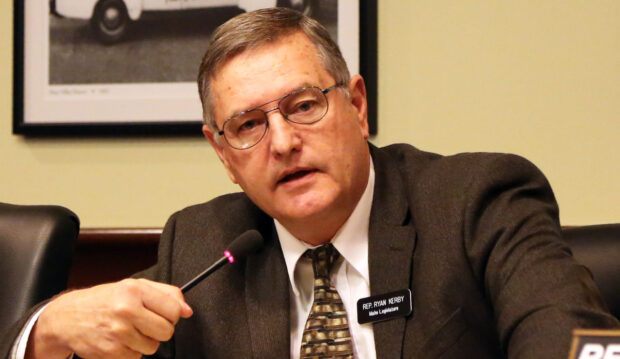The House Education Committee advanced a rewritten bill Monday that is intended to streamline education and reduce administrators’ reporting and paperwork requirements.

Pushed by Rep. Ryan Kerby, R-New Plymouth, House Bill 222 would reduce or eliminate several reporting requirements, many of which were originally put in place by the Legislature.
The 16-page bill touches on numerous programs and topics:
- It would create a state commission for education excellence to review and suggest changes to continuous improvement plans that school districts and charters must submit. The new commission would also look at ways to incentivize high-performing schools.
- It would cut in half the number of “domains” used annually in teacher evaluations. Under the bill, districts and charters would only need base evaluations on two of the four domains in The Charlotte Danielson Framework for Teaching for teachers holding a professional endorsement or advanced professional. Danielson’s framework is used as an evaluation tool used throughout Idaho and many other states.
- It would get rid of the requirement for school districts and charters to develop college and career advising plans for students in eighth through 12th grades.
- It would no longer require each school district and charter school to submit its literacy intervention plan to the State Board of Education.
Kerby’s bill is a rewritten version of House Bill 69. The committee expressed concerns about HB 69’s complexity.
When considering HB 69, Kerby urged lawmakers not to focus on the details, but instead look at it from a vantage point of 30,000 feet.
Kerby says the focus of his bill is eliminating paperwork and bureaucracy to focus on what people care about: “Are kids learning to read? Are they getting better at math? Are more industry certificates being earned in CTE programs, and so on?”
Kerby, House Education’s vice chairman, served as superintendent of the New Plymouth School District before retiring.
Rep. Steve Berch, D-Boise, cast the lone vote against advancing the bill. He told Idaho Education News it shouldn’t take a 16-page bill to create a new commission to focus on student achievement. Berch said the bill is an example of legislators micromanaging the educational system and executive branch of government.
House Bill 222 next heads to the House floor with a recommendation it passes.
Bond, levy disclosure bill could get a rewrite
The Senate will get a chance to amend a bill addressing ballot language for bond and levy elections.
Authors of House Bill 66 say they want to make sure school districts and other local governments fully explain the cost of ballot measures. According to the bill’s statement of purpose, the sponsors want the ballot language to spell out a ballot measure’s impact on local property taxes, while eliminating what the supporters call “distracting information.”
But that ballot language is, evidently, a work in progress. On Monday, Sen. Doug Ricks, R-Rexburg, said he had an agreement with the Idaho School Boards Association. The language would allow school districts to include language about current levies — to explain, in essence, whether a ballot measure is simply a levy renewal. However, school districts would also need to spell out how much property tax rates would decrease if a levy came off the books.
The Senate State Affairs Committee voted to move HB 66 to the Senate’s amending order, but with some reservations. Senators said they were uneasy because they haven’t seen the proposed amendments. And Senate President Pro Tem Chuck Winder pointed out that there’s a bigger issue — the question of whether Idaho is adequately supporting public schools — and he said he didn’t want to make it more difficult for districts to pass a needed supplemental levy.
“This has become a means to just keep our schools going,” said Winder, R-Boise.
The House has already passed HB 66 in its current form. If the Senate passes an amended version, the House would have to agree to the changes.
Senate passes charter commission bill
Without debate, the Senate unanimously approved a bill designed to give the state Public Charter School Commission more autonomy.
Senate Bill 1115 would move the commission out from under the office of the State Board of Education — which means the commission would be able to hire its own director without getting approval of State Board staff. The bill would also allow the governor to nominate all seven appointees to the commission; currently, the speaker of the House and and the Senate’s president pro tem each nominate two appointees.
With Monday’s 34-0 vote, the bill now goes to the House.
Hearing on sex education bill pushed to Tuesday
Much like Friday, House Education ran out of time Monday and could not get through its agenda. That means Rep. Barbara Ehardt’s sex education bill is on hold until Tuesday morning.
House Bill 249 would require parents to sign permission forms opting in their students for any discussion of human sexuality — in any class or subject — that goes beyond human anatomy and the physiology of human reproduction. This is the third consecutive year that Ehardt, R-Idaho Falls, has brought a bill aimed at requiring parents to opt children in for instruction that involves sex education or sexuality.
Idaho Education News covered Monday’s hearings remotely.
